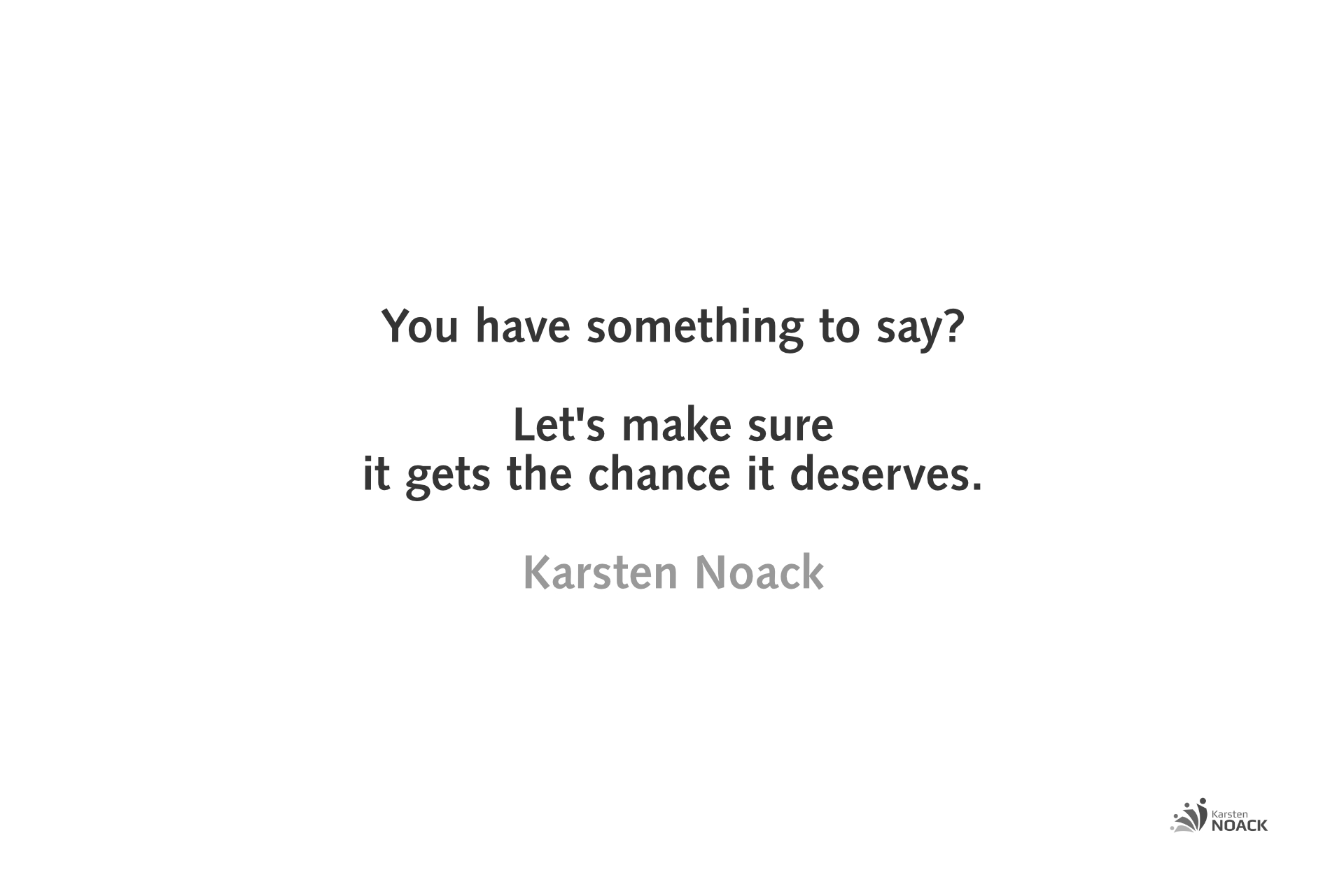How do you organize your speeches and presentations? In this article, you will find the simplest structure already taught at the school level. It is still taught because it still works.
Five fingers for a structured speech. Five-finger speech structure.
Five fingers for a structured speech. 5-finger speech structure.
How to structure your speech
5-finger speech structure
A good reason for speaking; a specific message has to be communicated. In practice, however, it happens far too often that in the end, it is not clear to the listener what it was about. Whether in speeches, presentations, or conversations, listeners very often ask themselves what it was all about.
It is usually because speakers have not thoughtfully structured their speech and have not prioritized the content. How about a hint to make it more effective?
It is better to structure your speech in such a way that the listeners clearly understand what you intended to convey to them at the end. This requires appropriate preparation. However, there is not always a lot of time available for this. Then, for example, the 5-finger speech structure can be very helpful. Here you can learn how.

How to structure speeches with the five-finger speech format
If the audience does not understand the intended message at the end of a speech, it is usually because speakers have not thoughtfully structured their speech and have not prioritized the content.
It is much better to structure speeches in such a way that the audience clearly understands what you wanted to convey to them at the end. This requires appropriate preparation. However, there is not always much time available for this. In meetings, for example, spontaneity is required. It is good to know that the 5-finger speech structure can also be very helpful for impromptu speeches. Here you can learn how.
The five-finger speech structure step by step
It’s a very simple procedure. Each finger of a hand represents a step. So you always have the order of your argumentation in your hand:
1. The thumb
The thumb is expressing the “status quo”. Give an overview of the actual situation. Describe the general conditions and possible consequences.
What is positive about it and what opportunities are associated with it. Where are changes urgently needed and what risks are identifiable.
What happens if no changes are made. Make sure that the meaning of the following statements is understood. If the audience is not concerned, the necessary willingness to become active is lacking.
2. The index finger
The index finger points to the target. When expressing the goal, orientate yourself on the SMART model and do not confuse it with the benefit.
As a reminder of the characteristics of SMART goals, you can read the article “Rather SMART goals than unfulfilled wishes. SMART goals make life easier.“
3. The middle finger
The middle finger describes the way, the implementation, and how the goal is achieved. Which measures are necessary to achieve the desired result.
Helpful questions for you:
- Who can make what contribution to the achievement of the goal?
- When should the goal be reached?
- Where will what be necessary?
- How should the goal be achieved?
- What resources are required, and where do they come from?
4. The ring finger
The ring finger stands for the benefits. Describe the specific benefits that the goal you are aiming for and the solution you are presenting have for the audience. Describe how the situation will change positively in the short, medium, and long term.
5. The little finger
The little finger is dedicated to the call to action.
At the end of your speech, describe the first step, which is easy to perform, and the corresponding concrete call to action. It should be neither too small nor too large. If it is too big, the project will not be set in motion. The speech ends with an appeal.
Conclusion
The five-finger speech structure is a practical and effective method of giving speech a form. It is easy to learn and memorize.
Preparation of important speeches and presentations
Those who do not speak are not heard, and even those who speak up are not always successful. There are a few more steps that need to be mastered.
Do you want to convince with your message and also as a personality? Then I will help you to prepare your speeches and presentations. You determine the scope. At least, I recommend a test run with professional feedback for you and your message. Then you will know how you and your content are perceived, what you should do, and what you should leave out, where there is potential. Why do you want to get such helpful feedback so late after your real performance? Then it is too late for adjustments. Benefit from the advantage. My definition of luck: Preparation meets opportunity.
You can best estimate for yourself where the effort is worthwhile concerning the expected benefit. Here you will find the fees for my support (communication, psychology, language, structure, voice, body language, storytelling, rhetorical means, media such as PowerPoint and Co., etc.)
You are not in Berlin right now? Then choose meetings with me via telephone or video support. Whereby, there are quite good reasons for a trip to Berlin.
By the way, many people suffer from such intense stage fright in front of an audience, and therefore their performance lags behind their possibilities. Too bad, because with my help performance in a good condition is possible. Just in case...
A good start: Professional feedback with suggestions for improvement
How persuasive are you and your messages in speeches and presentations? How good are you at the 111+ most important presentation skills? I have been analyzing speeches since 1998. After evaluating 14,375 speeches and presentations, and numerous mistakes of my own, most of which I only discovered after a delay, I can tell you exactly what works with which audience. Let me give you the feedback that will help you get ahead. You will receive essential feedback and recommendations, as well as the impulses you need to persuade your audience in concrete situations.
Are you interested? If so, here is how to get helpful feedback with recommendations for improving your speeches and presentations.
Just ask me personally
Please post any questions that may be of interest to other readers in the comments. Looking for professional help?
If you are interested in coaching, training or consulting, if you have organizational questions, or if you want to make an appointment, you can reach me best via this contact form (you can choose whether you want to enter your personal data) or via e-mail (mail@karstennoack.com). The privacy policy can be found here.
Transparency is important. That is why you will find answers to frequently asked questions already here, for example about me (profile), the services, the fees and getting to know me. If you like what you see, I look forward to working with you.
Remarks:
In the address bar of your browser, the URL should begin with "https://www.karstennoack.com/...". This indicates a secure connection (SSL). Whether you enter your real name is up to you.
How to organize your speech? Speech structure: Opening, body, conclusion
15 Tips for your speech writing – step by step
Learn how to solve speech writing problems in all phase of the speech writing process. How to write a speech – step by step.
Good speakers will offer additional perspectives
Does your speech offer some new insights to the audience? Do you invite them to explore another point of view? Or do you try to force them to accept your point of view?

This article is a short excerpt from the more comprehensive course materials my clients receive in group or individual training or coaching.
Published: March 6, 2015
Author: Karsten Noack
Revision: August 20th, 2023
Translation: ./.
German version: https://www.karstennoack.de/redestruktur-hand-finger/
K:
H:
T: RR
#3487